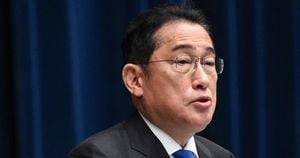The recent arrest of Ismael "El Mayo" Zambada, the notorious leader of the Sinaloa cartel, has sent shockwaves through both Mexico and the United States. This high-profile capture not only marks the decline of one of the world’s most powerful drug lords but also raises numerous questions about the intricacies of international drug trafficking and political collusion.
Zambada was apprehended on July 25, 2024, as he landed at El Paso International Airport after being transported from Mexico via private jet. His extradition to the U.S. was reportedly orchestrated by Joaquín Guzmán López, the son of the infamous El Chapo, who allegedly coerced Zambada onto the plane.
What's surprising is the backlash from Mexican officials following this event. Instead of viewing Zambada's capture as a victory for law enforcement, President Andrés Manuel López Obrador and other authorities are considering treason charges against those who facilitated his extradition.
This dramatic twist in events has left many questioning the motives behind the arrest. López Obrador, known for criticizing U.S. interference, suggested there's more to the story, hinting at concerns over foreign influence on Mexico's domestic issues.
Zambada's legal team has contested the U.S. narrative, asserting their client's capture wasn't voluntary. They claim he was misled to believe he was attending political discussions with significant state figures, including the governor of Sinaloa, only to be ambushed.
The situation escalated after Zambada alleged he was met by armed men who forcibly abducted him. His claims of being hooded and tied before being transported internationally introduce new angles to the discussion about ties between cartels and political figures.
Governor Rubén Rocha Moya of Sinaloa has since faced accusations related to his connections with drug lords, all of which he vehemently denies. The investigation is now delving deep, exploring potential connections between cartel operations and government officials.
Central to this investigation is the historical context surrounding treason definitions within Mexico. The legal framework allows for serious penalties against individuals accused of aiding foreign authorities, raising the stakes for anyone associated with Zambada's transport.
Compounding the intrigue, recent leaks revealed video evidence from around the time of Zambada's capture, showcasing attempts on the life of Culiacán's mayor. This footage raises critical questions about the overall integrity of Zambada's statements.
The U.S. has hailed this arrest as significant progress against drug trafficking networks. U.S. Attorney General Merrick Garland emphasized the importance of disrupting cartel operations, framing Zambada as one of the central cogs of the Sinaloa cartel.
Experts highlight these developments as indicative of shifting dynamics within drug trade strategies. On one hand, these arrests may signal serious governmental attempts to counter narcotics-related violence; on the other, they reflect the complex interplay of crime and politics.
According to U.S. officials, Zambada was responsible for countless lives lost and devastated communities. His impending trial, initially aimed at starting in New York, could shed light on the inner workings of the criminal enterprise.
Yet, controversies surrounding the validity of accusations play out through the media, complicatively placed against official accounts. Reports of Zambada’s kidnapping juxtaposed with government statements create friction within public perception.
Meanwhile, Guzmán López’s role in the extradition adds another layer of complexity. His involvement raises questions about loyalty, betrayal, and the motives behind the initiative to turn Zambada over to U.S authorities.
Public skepticism has already surfaced about the integrity of various state figures. The Sinaloan populace is divided as they witness their leaders potentially embroiled with key players of organized crime.
Protests and calls for transparency are likely to invoke unrest if the accusations are corroborated. The allure of cash and power has consistently shown to lead people astray, often consuming entire communities as they wrestle through the ramifications of cartel influence.
Shockwaves from Zambada's arrest extend beyond Mexico's borders, igniting diplomatic dialogues about drug policy. The overarching question lingers: Are U.S. approaches to tackling drug networks doing more harm than good?
Citizens are left to wonder how government officials will navigate this delicate balance of power and accountability. Will they prioritize public safety or shield their own from questionable alliances?
Mexico’s traditional reluctance to confront the realities of narcotics trafficking is now under urgent scrutiny. The responses from political leaders will determine the future of governance and law enforcement within the drug war context.
Notably, the U.S. Department of Justice continues to monitor these developments closely, contemplating how they will adjust strategies after the fallout from this high-profile arrest. There’s little doubt the ramifications will shape future approaches to both communities battling drug abuse and those wrestling under the thumb of drug lords.
This entire saga highlights the intertwined destinies of the U.S. and Mexico amid the chaotic backdrop of drug trafficking. For better or worse, Zambada’s capture offers insight, prompting action and reactions from both societies.
Both nations are now faced with the weight of collective histories tainted by organized crime. What kind of legacy will materialize from Zambada's downfall remains to be seen?
Many agree this arrest is not merely the end of Zambada but potentially signifies new chapters of violence or reform depending on how the ensuing conflicts are managed. The resilience of affected communities remains the linchpin, holding the potential for change amid the chaos.



